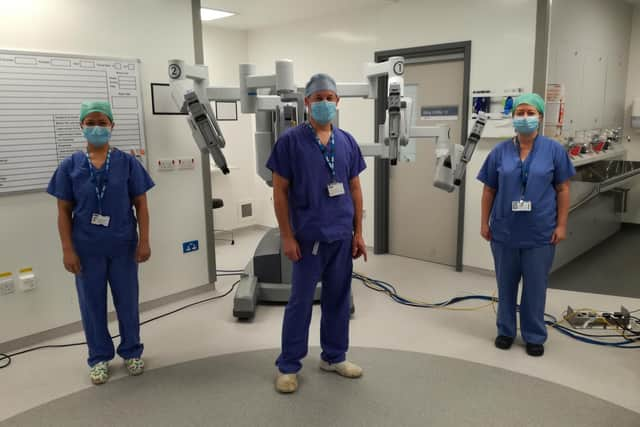Doncaster cancer patient operated on by a surgical robot
and live on Freeview channel 276
Consultant Urologist David Yates has completed the robot-assisted radical prostatectomies (the removal of the prostate to treat prostate cancer) using the Da Vinci Si robot at the Royal Hallamshire Hospital in Sheffield. The first operation was in October 2013.
The robot is used to operate on a wide variety of surgical patients including patients with cancers of the prostate, kidney, bladder, bowel and gynaecological malignancy.
Advertisement
Hide AdAdvertisement
Hide AdIt allows surgeons to perform delicate, complex and less invasive surgery from a sophisticated robotic platform.


One of Mr Yates’ recent prostate cancer patients was Alan Hoy, aged 64, of Doncaster, who was operated on in October 2021.
Mr Hoy’s twin brother died of the same illness four years ago.
Mr Hoy, who works as a factory operative for Next, said: “I didn’t have any symptoms but with the family history I went to the doctors for a health check and it was picked up.
Advertisement
Hide AdAdvertisement
Hide Ad“I knew the operation was using a surgical robot and I just wanted to get it done because of what had happened with my brother.”
Mr Hoy was able to go home the day after his surgery and said he was impressed with how quickly he recovered from the operation.
He said: “When I woke up I was in no pain at all, I was really quite surprised. I had the operation on a Friday afternoon and on Saturday I could get out of bed and walk to go to the toilet which was amazing really. There are just six small incisions.
“I was able to return home where a district nurse checked up on me.”
Advertisement
Hide AdAdvertisement
Hide AdHe said he had spoken to some of his work colleagues about his experience to encourage them to get checked out.
“Hopefully my situation can help to raise awareness in others,” he said.
Mr Yates said: “There are a number of benefits to using the robot. Patients have a much shorter hospital stay than for traditional open surgery, there is less blood loss, so no need for transfusions, and it is less invasive so patients can resume regular activity more quickly.”
In these confusing and worrying times, local journalism is more vital than ever. Thanks to everyone who helps us ask the questions that matter by taking out a subscription or buying a paper. We stand together. Liam Hoden, editor.
Comment Guidelines
National World encourages reader discussion on our stories. User feedback, insights and back-and-forth exchanges add a rich layer of context to reporting. Please review our Community Guidelines before commenting.
